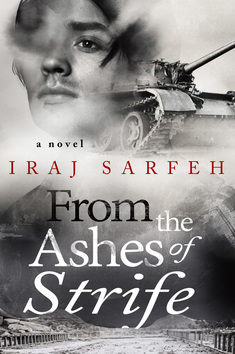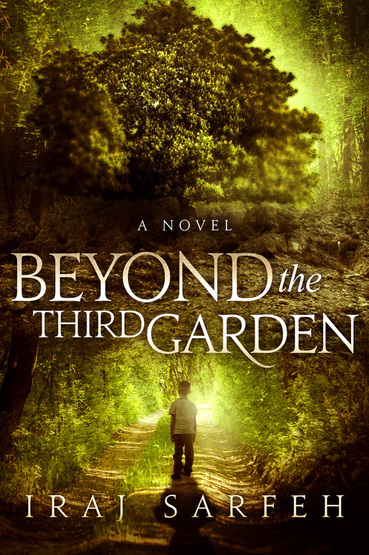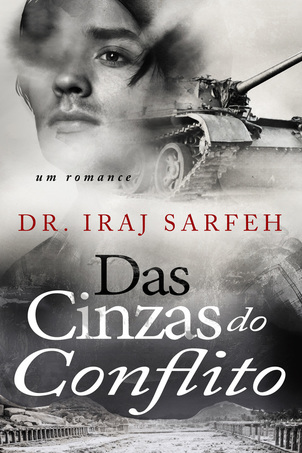Dr. Iraj Sarfeh, MD

After devoting thirty years to surgery, all of them at universities, I needed a rest and a change. Practicing medicine was gratifying, but it deprived me of life experiences outside hospitals and clinics and operating rooms. Write, my children said, because you’re a great story maker-upper. So I made up stories and published them. The first six were medical fiction, in the thriller or mystery or suspense genre with emphasis on surgeons whose characters are shaped by their profession.The next two, which are yet to be published, are of the literary fiction genre, stories in which I drew on my experiences as not only a surgeon, but as a person from Iran who lived away from home most of his life and who as a youngster suffered the barbs of prejudice.
From the Ashes of Strife

Ten-year-old Sohrab Vessali and his parents escape the violence of Iran’s Islamic Revolution to live in America. As the years pass and anti-Iranian sentiment soars, the bullying and taunting at school leave Sohrab confused and aimless. He becomes alienated from his domineering father, a former general in the Shah’s army determined to initiate a counterrevolution. But Sohrab’s wounds of alienation melt away when his father secretly returns to Iran and disappears. Have the mullahs imprisoned or executed him? Sohrab is obsessed to discover his father’s fate, hoping he is still alive so that they can undo the hurts of their turbulent past. He looks to Emily Clarke, an Iranian-born nurse who places her love and faith in him and helps him in the perilous quest.
Praise for From the Ashes of Strife
Reviewed by Carine Engelbrecht for Readers' Favorite
From the Ashes of Strife by I.J. Sarfeh opens with the explosive events of the Iranian Revolution. As the privileged son of a general in the Shah's army, Sohrab experiences the political tension from the safety of the family home, but when the family emigrates to the USA he enters a different type of struggle - prejudice and bullying. He learns to adapt, but while Sohrab and his mother Shireen enjoy greater liberties in America, his father Rostram pines for the glory days of his illustrious military career. When he decides to return to Iran, the whole family is plunged into a transformation that brings difficult choices and unexpected changes that no one could have foreseen.
To call this book a compelling read is an understatement. The author skillfully and vividly brings a cast of multi-faceted characters to life and explores the way their relations affect and influence each other. We see glimpses of a less privileged Iran filtered through in tales told by the family housekeeper, Ali, who grew up in the slums. But even for Ali, America brings new opportunities. Central to the story is the relationship between Sohrab and Rostram, which is at first plagued by conflict and misunderstanding, but which matures to mutual respect for the courage inherent in the choices of each. From the Ashes of Strife by I.J. Sarfeh lifts the veil on an Iran that lies beyond the seemingly impenetrable wall of religious fundamentalism. It is a requiem for a proud and intelligent society held hostage by fanaticism, but also serves as a reality check on some of the less obvious pitfalls of enjoying too much freedom.
Praise for From the Ashes of Strife
Reviewed by Carine Engelbrecht for Readers' Favorite
From the Ashes of Strife by I.J. Sarfeh opens with the explosive events of the Iranian Revolution. As the privileged son of a general in the Shah's army, Sohrab experiences the political tension from the safety of the family home, but when the family emigrates to the USA he enters a different type of struggle - prejudice and bullying. He learns to adapt, but while Sohrab and his mother Shireen enjoy greater liberties in America, his father Rostram pines for the glory days of his illustrious military career. When he decides to return to Iran, the whole family is plunged into a transformation that brings difficult choices and unexpected changes that no one could have foreseen.
To call this book a compelling read is an understatement. The author skillfully and vividly brings a cast of multi-faceted characters to life and explores the way their relations affect and influence each other. We see glimpses of a less privileged Iran filtered through in tales told by the family housekeeper, Ali, who grew up in the slums. But even for Ali, America brings new opportunities. Central to the story is the relationship between Sohrab and Rostram, which is at first plagued by conflict and misunderstanding, but which matures to mutual respect for the courage inherent in the choices of each. From the Ashes of Strife by I.J. Sarfeh lifts the veil on an Iran that lies beyond the seemingly impenetrable wall of religious fundamentalism. It is a requiem for a proud and intelligent society held hostage by fanaticism, but also serves as a reality check on some of the less obvious pitfalls of enjoying too much freedom.
Beyond the Third Garden, Now Available!

That Night is a blank except for the terrifying images popping up at random into ten-year-old Reza’s head—images of groping hands, swinging bottles, a woman beaten mercilessly. His mother and father are dead, and he does not know why. Living in an orphanage at the outskirts of Tehran, Reza has withdrawn into himself. To cope, he lives in the happy side of his imagination, daydreaming of the good days in the Third Garden where he lived before That Night.
He resolves escape from the hatred, anger, and torment.
After he is yet again thrashed for fighting, at midnight he scrapes a hole in the clay walls that surround his hell, climbs out, and finds his way to the foothills of the nearby Alborz Mountains. Penniless, hungry, and cold, he falls asleep in a pine forest. He wakes up to a kind, soothing voice belonging to a woman who looks like an older version of his mother. She is Paree Windom, an Iranian separated from her English husband, haunted by a horrifying event in her past. Filled with pity for the wretched orphan, she assumes Reza’s legal guardianship and moves him into her apartment.
Time strengthens their relationship, but it does not attain that of mother and son—they live in fear of yet again losing a loved one. While Reza feels increasingly at ease in his new home, he senses that Paree has her own dark secrets. Her husband, Mike, now living in western England, asks Paree and Reza to visit him. She reluctantly accepts—western England is the scene of the darkest chapter of her life. For the first few days, the visit is enjoyable, but on a rain-drenched evening, Mike walks into the house holding a bottle, a sight that triggers Reza’s horrific images of That Night. Panicking, he runs away and hides in the woods until Paree finds him. At Mike’s insistence, she and Reza meet informally with a friend, a psychiatrist who immediately diagnoses their problem. She advises that they confront the scenes of their torment and discuss them openly. By venting the torment and baring their souls, they gain intervals of freedom from the prison for wretched souls.
He resolves escape from the hatred, anger, and torment.
After he is yet again thrashed for fighting, at midnight he scrapes a hole in the clay walls that surround his hell, climbs out, and finds his way to the foothills of the nearby Alborz Mountains. Penniless, hungry, and cold, he falls asleep in a pine forest. He wakes up to a kind, soothing voice belonging to a woman who looks like an older version of his mother. She is Paree Windom, an Iranian separated from her English husband, haunted by a horrifying event in her past. Filled with pity for the wretched orphan, she assumes Reza’s legal guardianship and moves him into her apartment.
Time strengthens their relationship, but it does not attain that of mother and son—they live in fear of yet again losing a loved one. While Reza feels increasingly at ease in his new home, he senses that Paree has her own dark secrets. Her husband, Mike, now living in western England, asks Paree and Reza to visit him. She reluctantly accepts—western England is the scene of the darkest chapter of her life. For the first few days, the visit is enjoyable, but on a rain-drenched evening, Mike walks into the house holding a bottle, a sight that triggers Reza’s horrific images of That Night. Panicking, he runs away and hides in the woods until Paree finds him. At Mike’s insistence, she and Reza meet informally with a friend, a psychiatrist who immediately diagnoses their problem. She advises that they confront the scenes of their torment and discuss them openly. By venting the torment and baring their souls, they gain intervals of freedom from the prison for wretched souls.
Praise for Beyond the Third Garden
I always look forward to I.J. Sarfeh’s fiction with its blend of culture, well-conceived science, taut pacing and finely honed, very real characters. This is his first novel that runs outside the medical mystery genre he has written so effectively in. Beyond the Third Garden is an incredibly absorbing tale of redemption and healing. Two souls, locked into emotional isolation as a result of horrific events and loss, find healing through their tentative movements towards friendship. They come from two very different backgrounds. One is an accomplished, educated Iranian woman whose marriage is faltering after losing a son; the other is an uneducated orphan boy from a rural setting outside Tehran who has escaped the cruelty of an orphanage but still carries the burden of his past. The woman has traveled extensively and married outside her traditional culture to an English oil company executive, which puts her at odds with the prevailing culture at a time of great change. The boy has never been more than a few miles from the shack he was born into, but both carry deep, scarring secrets. Through a miracle of coincidence, they find each other along a stretch of mountain highway. Beyond the Third Garden is written in a gently alternating character point of view, which makes it all the more immediate and highly engaging. The two struggle equally to hide the things they must keep hidden, but for their friendship to grow, they must also reveal themselves. Finally, when all is laid bare recalling their most crippling experiences, real trust rises to blossom. I read this novel, set in both Iran and post-war England, in two sittings. I found myself actually stifling sobs as the momentum built to a conclusion that brings them their freedom from the torment of the past as inner demons are released into the light of day. The book also adds a welcome look into traditional, hospitable Iranian culture and the lilt of spoken Farsi to many readers that would otherwise know little of this language or its people, beyond the political headlines. I applaud the author for the raw honesty, emotional pain and clear understanding of the human condition he has fashioned here into beautifully crafted, memorable passages. This was a genre departure for me, but I’m looking forward to the next work author Sarfeh completes, in which ever genre his stories unfold.-Five Stars, Richard Sutton, Goodreads


